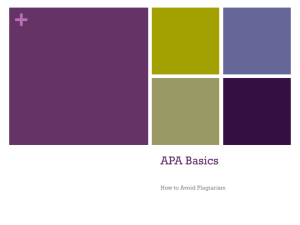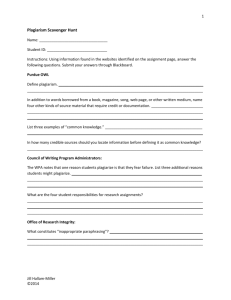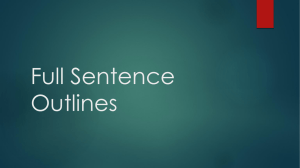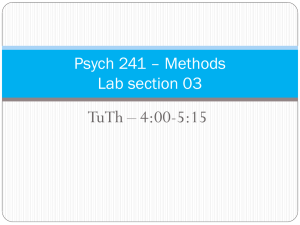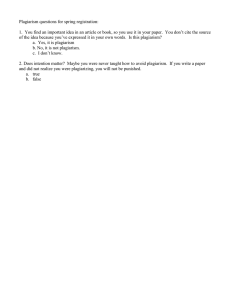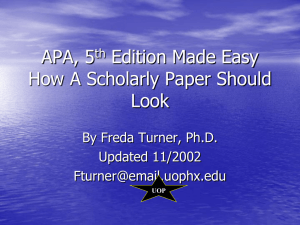Plagiarism is theft Plagiarism is cheating What is plagiarism?
advertisement
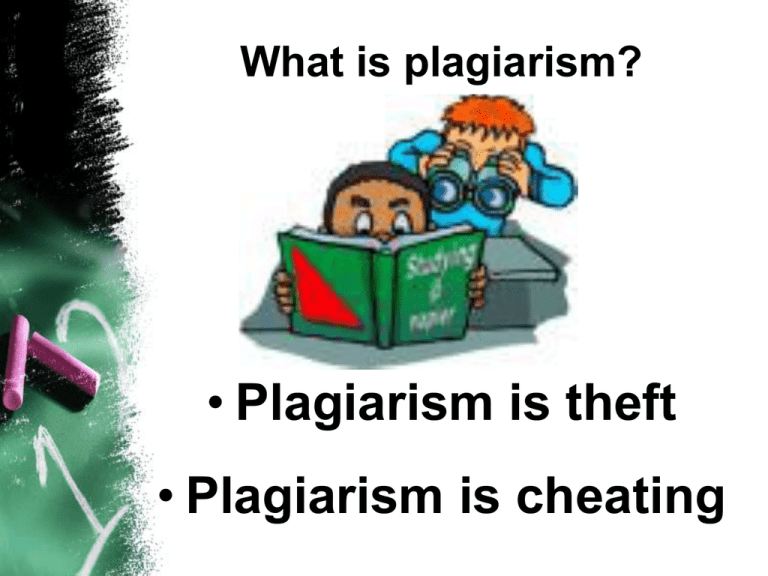
What is plagiarism? • Plagiarism is theft • Plagiarism is cheating How serious is the problem? • In a 2004/2005 study – “ 70% of U.S. college students admitted to having cheated at least once, more than 60% admitted to plagiarizing and nearly 40% said they have plagiarized from the Internet. » Centre of Academic Integrity Copyright … That’s just books ……right? More than just books! • Copyright respects the authors’ or producers’ ethical and legal ownership of their work. • Intellectual property includes books, articles, music, movies, artwork, photographs and the internet! • You must acknowledge when you do ANY kind of project, not just an essay. Why is plagiarism wrong? • If you plagiarize you are cheating yourself. You do not learn to write your thoughts in your own words and you don’t get feedback geared to your own needs and skills. • Plagiarism is dishonest because it misrepresents the work of another as your own How do people plagiarize? • Copying a friend’s homework or project • Using an essay from another course/source • Copying and pasting from an online database, electronic encyclopedia or the internet How do people plagiarize? • Presenting another person’s idea as your own • Buying a paper from the internet or another source • Quoting from a source without proper citation • Paraphrasing a source without proper citation Caught Teachers:• know you and your writing style • know primary and secondary sources • Know how to trace questionable information According to Harvard University guidebook, any student found guilty of plagiarism must withdraw from school for two semesters … He or she also loses all of the college (University) credit accumulated up to that point. » March-April 2004 University of Toronto • Grade of zero or failure. • Reduction and penalty of final grade. • Suspension from the university for one year. • Academic probation upon return. • Decided by a public tribunal. Code of Behaviour on Academic Matters, 2007 What research and writing skills are needed? • Asking key questions • Note-taking • Organizing • Paraphrasing • Revisiting and editing • Citing sources How can I avoid plagiarizing? Acknowledge your sources when you write a research paper, create a poster, post a web site or do a presentation. Ontario School Library Association Curriculum Support 2002 Citing References APA style Why do you need to cite ? • To establish that you must give credit whenever you have used someone’s else ideas • To provide support for your ideas and arguments • To allow others to find and verify your sources quickly and easily APA - ENCYCLOPEDIA article no author Follow these color codes: Author(s) Date Title of Book Title of Article Title of Periodical Volume Pages Place of Publication Publisher Other Information Helium. (2005). In The World Book Encyclopedia.(Vol. 9, pp. 175-1772). Chicago, IL: World Book. APA – ELECTRONIC SOURCES web page on the Internet, no author Follow these color codes: Author(s) Date Title of Book Title of Article Title of Periodical Volume Pages Place of Publication Publisher Other Information Helium (n.d.). Los Alamos National Lab – Chemistry Division. Retrieved February 27, 2009, from http://periodic.lanl.gov./elements. APA formatting rules for “reference” entries • Use a separate sheet of paper • Place at the end of essay/report • First line of each entry starts at the left margin, all succeeding lines are indented. This is known as a hanging indent • Double space between each entry • Place in alphabetical order by the first word in entry References Carrey, A., & Hollis, F. (1989). Fish and underwater life. Boston: Big Press. Fisher, H. (n.d.). The best way to entertain your cat. Cats are fun. Retrieved August 4, 2000, from http://www.catsarefun.com/entertain Giblets, K.N., & Homey, J.N. (Eds.). (1993). Children behaviors: Behavior modifications and interventions. San Francisco: Jonessy-Blithum. Harris, P.K. (1998, July 14). The young generation. Seattle: Coastal University. Retrieved June 5, 2000 from, http://www.coastaluniversity.edu/younggen Statton. B. (Ed.). (1983). Idioms. The dictionary of deaf culture (4th ed., Vol. 1, 142-156). Washington, D.C.: Deaf Press.
